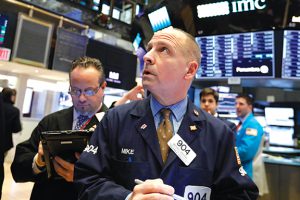Bloomberg
Index futures signalled a rout in US stocks on Thursday after the Federal Reserve signalled willingness to accept a recession and rise in unemployment in its resolve to contain elevated inflation.
September contracts on the S&P 500 and Nasdaq 100 gauges slumped at least 2.4% each, with traders giving up their initial optimism over Fed Chair Jerome Powell’s comments that super-sized rate hikes won’t be the norm. Renewed concerns about the impact of monetary tightening on economic output and asset
valuations sparked a rout in Treasuries and sent the dollar up for the sixth time in seven days. European stocks headed for a 16-month low and the Chinese internet shares dropped in premarket New York trading.
After the Fed raised interest rates by the most since 1994, Powell indicated a monetary stance similar to that of Paul Volcker, who broke the back of elevated inflation four decades ago but paid a price in the form of soaring unemployment and a credit squeeze. Powell’s comments signaled the Fed’s resolve to continue on an aggressive path of rate hikes — and that bond yields and equity risk premiums must rise to adjust to the new reality.
“The volatility in bond markets is definitely not over,†Jasmin Argyrou, director and portfolio manager at Credit
Suisse Private Bank, said on Bloomberg Television. “The likelihood is that policy rates in the US may need to go to a more restrictive stance than even the market is pricing in.â€
The decision took the target range for the federal funds rate to 1.5% to 1.75%. Officials projected 3.4% by year-end and 3.8% by the end of 2023. The Fed also reiterated it will shrink its balance sheet by $47.5 billion a month — a move that took effect June 1 — stepping up to $95 billion in September.
Traders now turn their attention to the UK, where the Bank of England is expected to deliver a fifth-straight rate hike on Thursday. Gilts advanced before the decision at noon London time, as money markets pared tightening bets on the back of worries over the economic outlook and disputes related to Brexit.
The 10-year Treasury yield rises 10 basis points on Thursday, erasing half of the 19 basis-point plunge on Wednesday. Europe’s Stoxx 600 equity gauge fell about 2%, while the euro and pound extended their slides.
Chinese internet companies NetEase Inc and Pinduoduo Inc slid at least 4.9% each in early New York trading. Technology shares were among the biggest losers on Thursday globally as their higher valuations relative to other sectors turned unappealing on the back of rising bond yields.
European stocks tumbled, with the benchmark Stoxx 600 measure heading for the lowest close since February 2021. For investors in the region, worries over monetary policy revolved around the European Central Bank’s perceived delay in starting a rate-hike cycle and its slow process around developing a tool to prevent bond-yield fragmentation within the euro area. German two-year bond yield jumped 16 basis points.
In the commodity markets, crude oil fluctuated as traders weighed the outlook for supply and demand amid Fed tightening and rising US crude output. Bitcoin erased a gain.
 The Gulf Time Newspaper One of the finest business newspapers in the UAE brought to you by our professional writers and editors.
The Gulf Time Newspaper One of the finest business newspapers in the UAE brought to you by our professional writers and editors.
